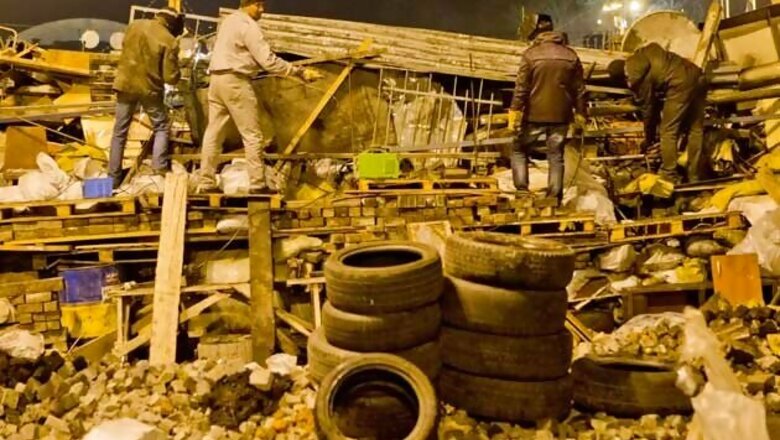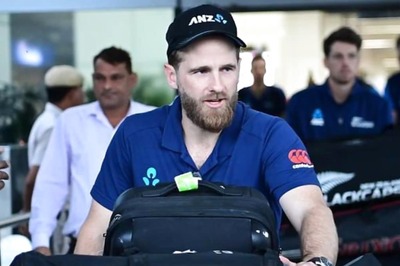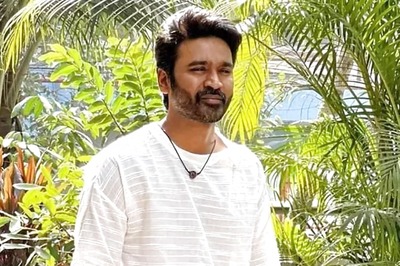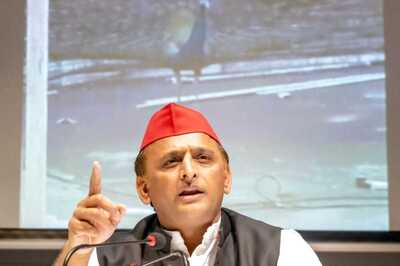
views
Kiev: Protesters advanced on police lines in the heart of the Ukrainian capital on Thursday, prompting government snipers to shoot back and kill scores of people in the country's deadliest day since the breakup of the Soviet Union a quarter-century ago.
The European Union imposed sanctions on those deemed responsible for the violence, and three EU foreign ministers held a long day of talks in Kiev with both embattled President Viktor Yanukovych and leaders of the protests seeking his ouster. But it's increasingly unclear whether either side has the will or ability to compromise.
Yanukovych and the opposition protesters are locked in a battle over the identity of Ukraine, a nation of 46 million that has divided loyalties between Russia and the West. Parts of the country - mostly in its western cities - are in open revolt against Yanukovych's central government, while many in eastern Ukraine back the president and favor strong ties with Russia, their former Soviet ruler.
Protesters across the country are also upset over corruption in Ukraine, the lack of democratic rights and the country's ailing economy, which just barely avoided bankruptcy with a $15 billion aid infusion from Russia.
Despite the violence, defiant protesters seemed determined to continue their push for Yanukovych's resignation and early presidential and parliamentary elections. People streamed toward the square Thursday afternoon as other protesters hurled wood, refuse and tires on barricades.
"The price of freedom is too high. But Ukrainians are paying it," said Viktor Danilyuk, a 30-year-old protester. "We have no choice. The government isn't hearing us."
In an effort to defuse the situation, the national parliament late Thursday passed a measure that would prohibit an "anti-terrorist operation" threatened by Yanukovych to restore order, and called for all Interior Ministry troops to return to their bases. But it was unclear how binding the move would be. Presidential adviser Marina Stavnichuk was quoted by the Interfax news agency as saying the measure goes into effect immediately, but that a mechanism for carrying it out would have to be developed by the president's office and the Interior Ministry.
At least 101 people have died this week in the clashes in Kiev, according to protesters and Ukrainian authorities, a sharp reversal in three months of mostly peaceful protests. Now neither side appears willing to compromise.
Thursday was the deadliest day yet at the sprawling protest camp on Kiev's Independence Square, also called the Maidan. Snipers were seen shooting at protesters there - and video footage showed at least one sniper wearing a Ukraine riot police uniform.
One of the wounded, volunteer medic Olesya Zhukovskaya, sent out a brief Twitter message - "I'm dying" - after she was shot in the neck. Dr. Oleh Musiy, the medical coordinator for the protesters, said she was in serious condition after undergoing surgery.
Musiy told The Associated Press that at least 70 protesters were killed Thursday and over 500 were wounded in the clashes - and that the death toll could rise further.
In addition, three policemen were killed Thursday and 28 suffered gunshot wounds, Interior Ministry spokesman Serhiy Burlakov told the AP.
The National Health Ministry said a total of 75 people died in the clashes Tuesday and Thursday, but did not give a breakdown. Earlier Thursday, however, it said 28 people had died.
There was no way to immediately verify any of the death tolls.
French Foreign Minister Laurent Fabius, along with his German and Polish counterparts, said after a five-hour meeting with Yanukovych and another with opposition leaders that they discussed new elections and a new government, but gave no details. The three resumed meeting with Yanukovych late Thursday.
"For now, there are no results," said an opposition leader, Vitali Klitschko.
Video footage on Ukrainian television showed shocking scenes Thursday of protesters being cut down by gunfire, lying on the pavement as comrades rushed to their aid. Trying to protect themselves with shields, teams of protesters carried bodies away on sheets of plastic or planks of wood.
Protesters were also seen leading policemen, their hands held high, around the sprawling protest camp in central Kiev. Ukraine's Interior Ministry says 67 police were captured in all. An opposition lawmaker said they were being held in Kiev's occupied city hall.
The Interior Ministry said late Thursday that security forces may use force to free the captured police.
In Brussels, the 28-nation European Union decided in an emergency meeting Thursday to impose sanctions against those behind the violence in Ukraine, including a travel ban and an asset freeze against some government officials. It was unclear whether the EU would consider any of the opposition figures to also have a share of responsibility in the bloodshed.
German Chancellor Angela Merkel spoke with Russia's President Vladimir Putin and President Barack Obama about the crisis Thursday evening. She briefed them about the trip of the three EU foreign ministers to Kiev, and all three leaders agreed that a political solution needs to be found as soon as possible to prevent further bloodshed.
Saying the U.S. was outraged by the violence, Obama urged Yanukovych in a statement to withdraw his forces from downtown Kiev immediately. He also said Ukraine should respect the right of protest and that protesters must be peaceful.
The White House said U.S. Vice President Joe Biden spoke by telephone with Yanukovych on Thursday afternoon and made clear that the U.S. is prepared to sanction those officials responsible for the violence.
The Kremlin issued a statement with Putin blaming radical protesters and voicing "extreme concern about the escalation of armed confrontation in Ukraine."
The Russian leader called for an immediate end to bloodshed and for steps "to stabilize the situation and stop extremist and terrorist actions." He also sent former Russian ombudsman Vladimir Lukin to Ukraine to act as a mediator.
Although the first weeks of the protests were determinedly peaceful, radical elements have become more influential as impatience with the lack of progress grows. In their battles Thursday, those protesters, wearing hard hats and armed with bats and other makeshift weapons, regained some territory on the fringes of Independence Square that police had seized earlier in the week.
One camp commander, Oleh Mykhnyuk, told the AP that protesters threw firebombs at riot police on the square overnight. As the sun rose, police pulled back, protesters followed them and police then began shooting at them, he said.
The Interior Ministry warned Kiev residents to stay indoors because of the "armed and aggressive mood of the people."
Yanukovych claimed that police were not armed and "all measures to stop bloodshed and confrontation are being taken." But the Interior Ministry later contradicted that, saying law enforcers were armed as part of an "anti-terrorist" operation.
Russia appears increasingly frustrated with Yanukovych's inability to find a way out of the crisis.
Prime Minister Dmitry Medvedev said Russia will "try to do our best" to fulfill its financial obligations to Ukraine, but indicated Moscow would hold back on further bailout installments until the crisis is resolved.
"We need partners that are in good shape and a Ukrainian government that is legitimate and effective," he said.
Some signs emerged that Yanukovych is losing loyalists. The chief of Kiev's city administration, Volodymyr Makeyenko, announced Thursday he was leaving Yanukovych's Party of Regions.
"We must be guided only by the interests of the people, this is our only chance to save people's lives," he said, adding he would continue to fulfill his duties as long as he had the people's trust.
Another influential member of the ruling party, Serhiy Tyhipko, said both Yanukovych and opposition leaders had "completely lost control of the situation."
"Their inaction is leading to the strengthening of opposition and human victims," the Interfax news agency reported him saying.
Prior to the clashes Thursday, the Ukrainian Health Ministry said 287 wounded had been hospitalized this week. But protesters who have set up a medical facility in a downtown cathedral so that wounded colleagues would not be snatched away by police say the number of wounded is significantly higher - possibly double or triple that.
The Caritas Ukraine aid group praised the protest medics but said many of the wounded will need long-term care, including prosthetics.

















Comments
0 comment